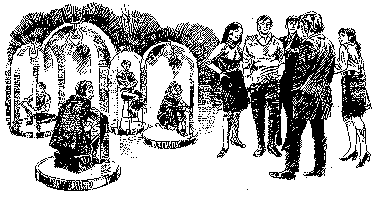The Gospel and a Controversial Text
 Geoffrey J. Paxton Geoffrey J. Paxton
Do not get drunk on wine, which leads to debauchery. Instead, be tilled with the Spirit.—Eph. 5:1 8.
(Scripture quotations are from the New International Version.)
The context of Ephesians 5:18 makes clear that it is concerned with the well-being of the believer, particularly in face of the "fruitless deeds of darkness" (5:11). The concern is to protect the children of light from the shameful actions of those who still do not acknowledge the Lordship of Jesus (5:12). Stated positively, the concern is to insure that the children of God live as wise people (5:15), knowing what the will of the Lord is for them.
It is important to understand that Paul's concern here is not simply for moral correctness—a sort of cold morality. We are to recognize the evil jaws which lurk behind and in the behavior of the unregenerate. This existential monster is bent upon excluding from the kingdom of Christ (5:5) and rendering its victims liable to the dreaded wrath of God (5:6).
 The commands, "Do not get drunk on wine. . . . Instead, be filled with the Spirit," are given in the interest of protecting the children of God from the evil jaws of unregenerate recklessness. The context is not one of some deficiency which the Ephesians need to remedy. It is not as though the apostle wishes to lead them on to a higher stage in the process of salvation. Rather, the exhortation is (negatively) to not occupy themselves with that which will lessen their hold on the way of truth, but (positively) to occupy themselves with that which will fix their grasp on Christ and His kingdom. The commands, "Do not get drunk on wine. . . . Instead, be filled with the Spirit," are given in the interest of protecting the children of God from the evil jaws of unregenerate recklessness. The context is not one of some deficiency which the Ephesians need to remedy. It is not as though the apostle wishes to lead them on to a higher stage in the process of salvation. Rather, the exhortation is (negatively) to not occupy themselves with that which will lessen their hold on the way of truth, but (positively) to occupy themselves with that which will fix their grasp on Christ and His kingdom.
The controversial text, Ephesians 5:18, is given in the interest of the perseverance of the saints and not in the interest of a higher status in the body of Christ. Being filled with the Spirit is meant to safeguard against immodesty of all kinds and to insure a stability and temperance in the Holy Spirit which leads to eternal blessedness. The pilgrim on his way to the Celestial City is characterized by joyful sobriety and fussless recognition of his responsibilities in church (5:19) and at home (5:21).
The Meaning of "Be Filled with the Spirit"
What does "be filled with the Spirit" mean? The answer is found in the meaning of the words "filled" and "Spirit." Let us look at each of them in turn and then put them together for their combined forcefulness.
"Filled." When we hear the word "filled," we automatically think of substance, some liquid-like reality. Also, the application of the exhortation to be "filled" is thought of in terms of our own being. But to think of substance and being—our being—is to think of something static, and this is to think like the Greeks more than like the Hebrews and the Christian Scriptures.
When we hear the word "filled" in a context like that of Ephesians 5:18, we should think in a dynamic way, not a static way. We should not think of being filled in our own being in virtual isolation from everyone else, but of ourselves in relation to others, and in particular, in relation to the people of God.
To catch a glimpse of the dynamic interpretation of "filled," we need to notice some significant clue words. The first clue word is "always" in Ephesians 5:20. "Always" is a fullness word with reference to man as a creature in time. The thought is not of man as a static, timeless being, but of a being in time. Hence, being "filled" has decided reference to how we spend our time.
Next let us consider the word "everything" in Ephesians 5:20. "Everything" is another fullness word, this time with reference to man as a creature in relation to other things and events over which he may have little control.
The final fullness word to be noticed here is the word "another" in Ephesians 5:19. To be exact, it is "one another." The "Speak to one another" here is significant for at least three reasons:
1. The expression is obviously meant to convey the concrete content of what being filled with the Spirit means.
2. The expression indicates that man is man in relationship to other like creatures. Man is not only man in relation to time, man in relation to things, but he is also man in relation to other men, to people. This is to say nothing of the most basic aspect of man—namely, that he is man in relation to God (5:19b).
3. "Speak to one another" reminds us that speech is one of the most basic means of communication. The real point here is that "be filled" and "Speak" are complementary. The evidence or sign of being filled is to be seen in the what and how of addressing the other person.
We must now put all this together: Being "filled" does not refer primarily to an experience within an isolated me, but to something that takes place in concrete relationships such as to time, to things (including events) and to others (especially the children of God). The expression or indication of the Spirit's work is not a spellbinding luminosity or infatuation with feeling, but the communicating with others.
"Spirit" We can think of what we have said thus far as the sphere of being filled. Before we can understand the content of being filled, we must look at the word "Spirit." The concrete content of the fullness spoken of here will be determined by the identification of the "Spirit" of Ephesians 5:18, for the Spirit is that with which we are to be filled. Who or what is this Spirit?
1. The Spirit here is most likely the Holy Spirit of God, the Third Person of the Trinity. Though some take Spirit here to mean man's spirit, it is quite certain that it is God's Spirit who is being referred to.
2. The reference to the Holy Spirit means that the reference is to a distinct Person, not to a substance (we should be suspicious of that word by now!) or an impersonal force. This is important. When we think of being "filled" with this Person, we are to think of being filled as we would think of being filled with any person (notwithstanding that the Holy Spirit is special—unique and that He is Spirit). Let us consider the way we could be full of another person. Such a fullness would be seen in the way we would use our time. All day and every day we would be concerned with that person. That person would determine our approach to everything and every event. Not least, that person would determine our approach to others.
3. But can we not say more—must we not say more —about the identity of the Spirit in Ephesians 5:18? Indeed we can and we must! The Holy Spirit is also the Spirit of Christ. This is an important though sadly neglected truth. The Holy Spirit as the Spirit of Christ means the following:
a. The Holy Spirit proceeds from the Son as well as from the Father, as our creeds and several church councils affirm.
b. The Holy Spirit, then (we say "then" because there is a real connection between this point and the previous one), is sent not only from the Father (John 14:16, 26), but also from the Son (John 15:26). Jesus the Lord is the Lord and Giver of the Spirit (cf. Acts 2:33f.). Hence, the Spirit is called the "Spirit of His [God's] Son" (Gal. 4:6), the "Spirit of Jesus" (Acts 16:7) and the "Spirit of Christ" (Rom. 8:9; cf. also Phil. 1:19).
c. This point is a little difficult to express. We do not wish to be misunderstood. Notwithstanding the fact that the Holy Spirit is a distinct Person in the Godhead, the preoccupation of the Spirit is not with Himself but with Jesus Christ. In fact, the Holy Spirit is Christ present in the church and in the individual believer.
The Christ with whom the Spirit is preoccupied is the Christ "clothed in His Gospel" (Calvin). John 16:13f. tells us that the Holy Spirit receives His knowledge from the Son. What the Spirit hears, that shall he also speak. Jesus said of the Spirit, "He shall receive of Mine and shall show it unto you." Just as the Son receives His knowledge from the Father (John 8:26 et seq.), so the Spirit receives His knowledge from the Son.
Thus, the Spirit is not an independent area of study (apologies for those systematic theologies that have suggested otherwise!). He is not a legitimate parallel area alongside of Christ, nor is the Spirit in any way a competitor with Christ. To expound the Spirit is to expound the Son clothed in His gospel. The Spirit comes from Christ with the express purpose of leading us to Christ. Jesus said, "He will bring glory to Me . . ."(John 16:14).
 Therefore, to be filled with the Spirit is to be filled with the Spirit's message concerning Christ clothed in His gospel. The fullness of the Spirit is the Spirit's glorification of Christ taking up all our time ("always"), determining our attitude and approach to all things ("everything"), and being the content of our communication with our fellow Christians ("Speak to one another"). Therefore, to be filled with the Spirit is to be filled with the Spirit's message concerning Christ clothed in His gospel. The fullness of the Spirit is the Spirit's glorification of Christ taking up all our time ("always"), determining our attitude and approach to all things ("everything"), and being the content of our communication with our fellow Christians ("Speak to one another").
To state this another way, the Spirit's mission is the proclamation and spread of the gospel of Christ. To be full of the Spirit is to have the concrete relationships of existence determined by that gospel. When this is the case, the believer will not be unstable like the drunk and will not fall prey to the drunk's forgetfulness of proper limits.
What is the content of our involvement in this? What is the significance of Paul's telling us to be filled? With his usual astuteness, Calvin speaks of "deep drinking" in reference to the passage under examination. The human side of the fullness of the Spirit is our "deep drinking" of the gospel in every way possible. Just as the drunk never leaves the bottle alone, so we are never to leave the saving knowledge of the gospel alone. According to Ephesians 5:19, the material that we are to share with others is "psalms, hymns and spiritual songs." Their content in Scripture is the mighty, saving action of God in Jesus Christ. The definitive Self-disclosure of God in Jesus Christ is to be the daily food of the believer. Then we will realize the truth of the words of Paul in Romans 1:16:". . . the gospel . . . is the power of God for the salvation of everyone who believes. . . ." Here are no gimmicks, no spiritual "beatings," no legalistic devices, but the wooing, winning gospel of God's love for His church in Jesus Christ.
|
 Geoffrey J. Paxton
Geoffrey J. Paxton The commands, "Do not get drunk on wine. . . . Instead, be filled with the Spirit," are given in the interest of protecting the children of God from the evil jaws of unregenerate recklessness. The context is not one of some deficiency which the Ephesians need to remedy. It is not as though the apostle wishes to lead them on to a higher stage in the process of salvation. Rather, the exhortation is (negatively) to not occupy themselves with that which will lessen their hold on the way of truth, but (positively) to occupy themselves with that which will fix their grasp on Christ and His kingdom.
The commands, "Do not get drunk on wine. . . . Instead, be filled with the Spirit," are given in the interest of protecting the children of God from the evil jaws of unregenerate recklessness. The context is not one of some deficiency which the Ephesians need to remedy. It is not as though the apostle wishes to lead them on to a higher stage in the process of salvation. Rather, the exhortation is (negatively) to not occupy themselves with that which will lessen their hold on the way of truth, but (positively) to occupy themselves with that which will fix their grasp on Christ and His kingdom. Therefore, to be filled with the Spirit is to be filled with the Spirit's message concerning Christ clothed in His gospel. The fullness of the Spirit is the Spirit's glorification of Christ taking up all our time ("always"), determining our attitude and approach to all things ("everything"), and being the content of our communication with our fellow Christians ("Speak to one another").
Therefore, to be filled with the Spirit is to be filled with the Spirit's message concerning Christ clothed in His gospel. The fullness of the Spirit is the Spirit's glorification of Christ taking up all our time ("always"), determining our attitude and approach to all things ("everything"), and being the content of our communication with our fellow Christians ("Speak to one another").